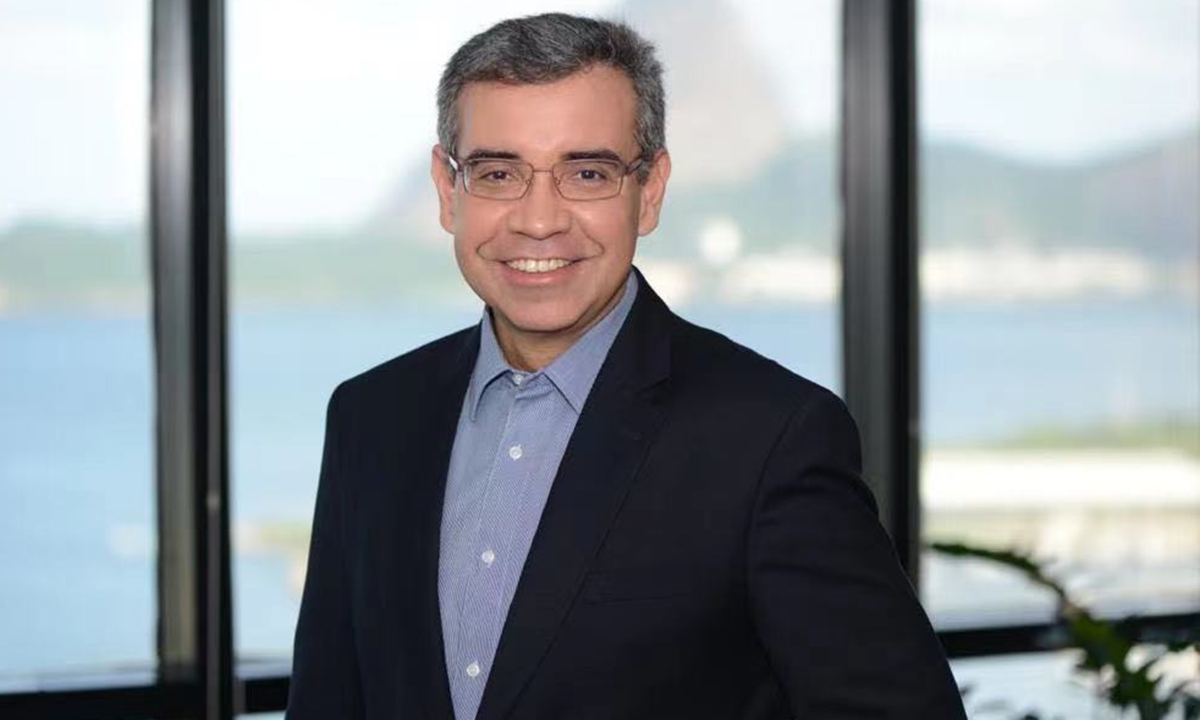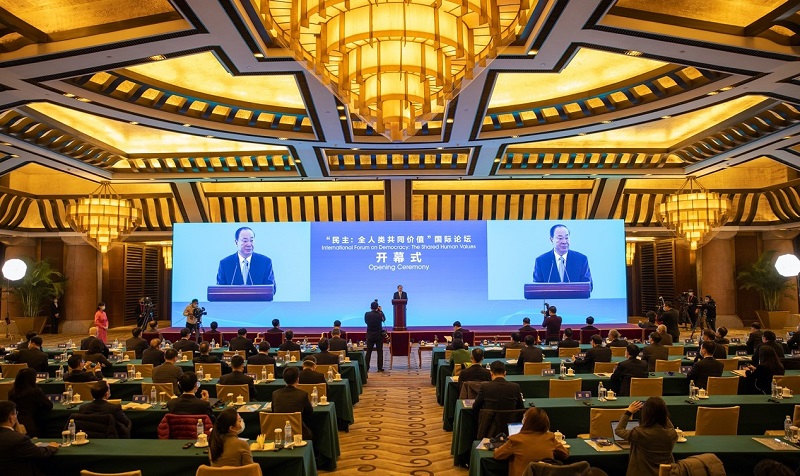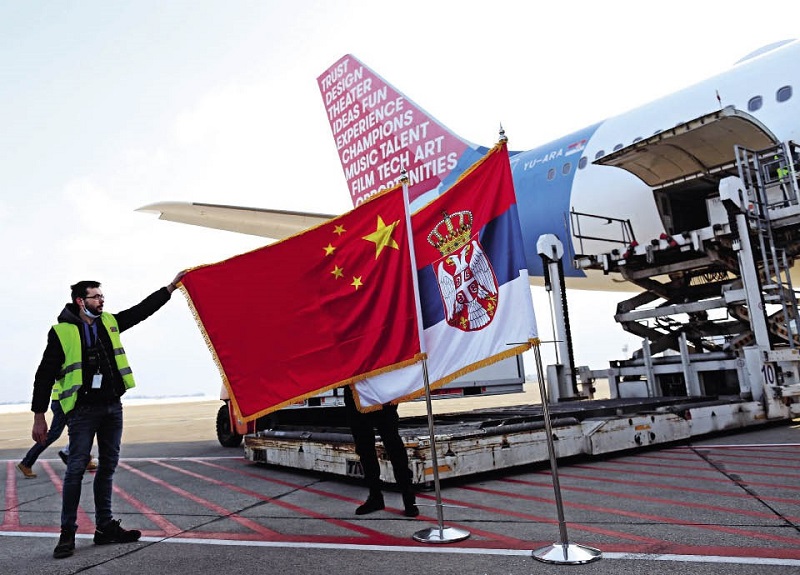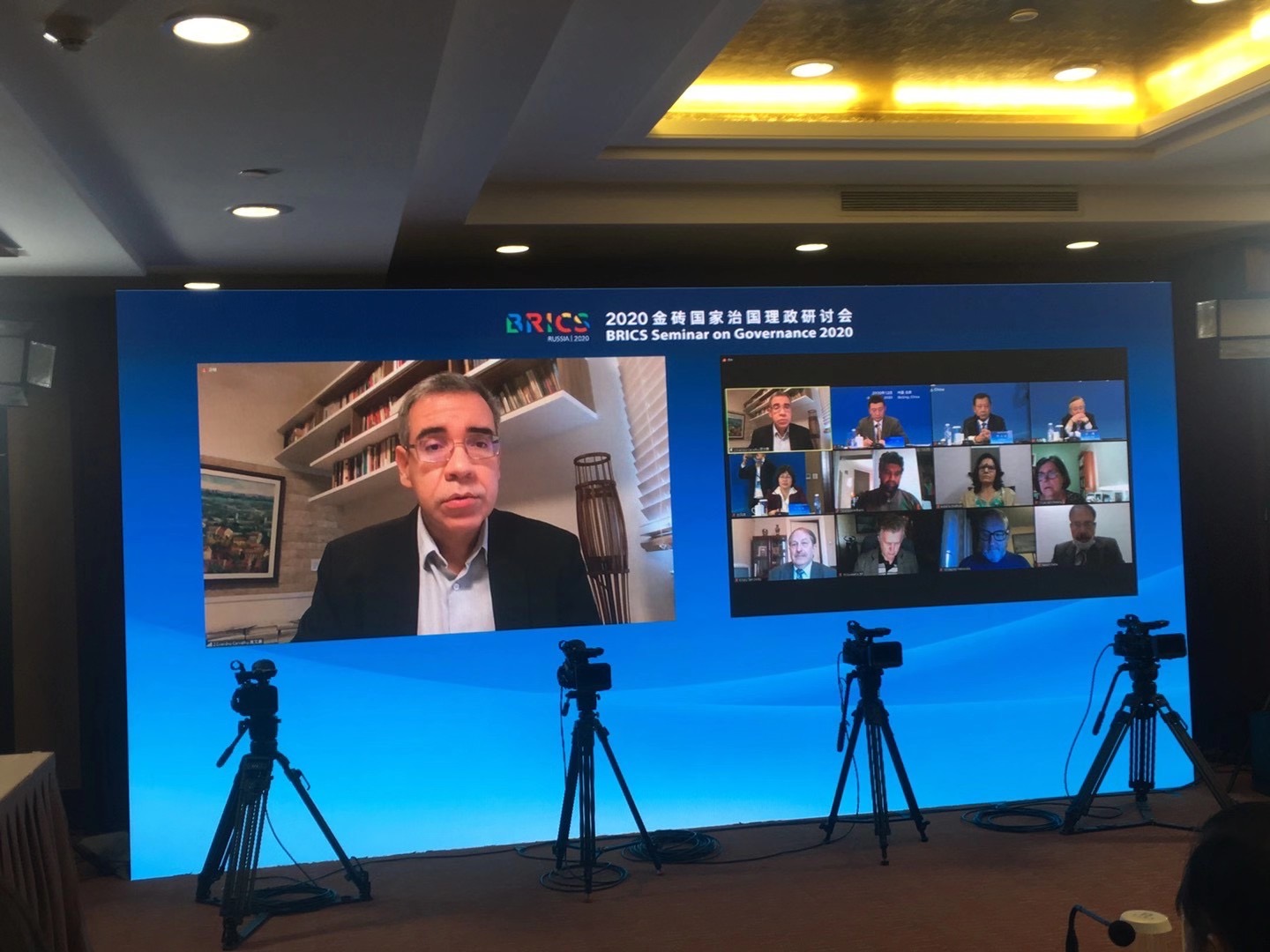Los BRICS promueven la construcción de un nuevo orden internacional para el siglo XXI
Entrevista que dei para a CGTN Español sobre a Cúpula do BRICS em agosto deste ano de 2023.
Disponível no link: https://www.youtube.com/watch?v=4l4vlTFYfQs
Entrevista que dei para a CGTN Español sobre a Cúpula do BRICS em agosto deste ano de 2023.
Disponível no link: https://www.youtube.com/watch?v=4l4vlTFYfQs

Among the topics on the table for the upcoming BRICS Summit in South Africa in late August, we could highlight the prominent topics related to the use of national currencies for intra-BRICS (Brazil, Russia, India, China and South Africa) trade relations and the expansion of the grouping. However, a third topic deserves greater attention: cooperation in digital infrastructure for developing digital economies and governance.
While the proposal to have a common BRICS currency is currently out of the question, the proposal that aims to expand agreements to finance bilateral trade in their national currencies has gained strength among the five countries. The risks to economic sovereignty arising from excessive dependence on the U.S. currency and the need to reduce transaction costs in intra-BRICS trade relations make this agenda item a priority.
The process of the de-dollarization of the global economy will be slow. Still, it seems irreversible and partly driven by China’s dedicated diplomatic effort to promote the yuan in its relations with its partner countries. Most trade deals between Russia and China are already being conducted with the Russian ruble and the yuan. The agreement between China and Brazil to facilitate the direct transaction between the Brazilian real and the yuan in bilateral commercial operations was well received and accepted in Brazil, signaling that Brazilian economic actors are on board with this measure.
Delicate issue
The same cannot be said for the expansion of BRICS. That is a delicate issue due to the change in international geopolitics that the expansion of the group could bring. Since it proposed BRICS Plus in 2017, China has already been signaling that it wants to expand the BRICS grouping. For its part, Brazil understood that outreach dialogues with countries invited to participate in the summits were sufficient.
But recently, the proposed expansion of the BRICS grouping gained new impetus due to an “external stimulus.” More than 40 countries have expressed interest in definitively joining the grouping. What is the reason for this growing interest in the BRICS grouping, which, in its early years, was viewed with a certain skepticism by the international community, especially Western powers? The search for inclusive and results-oriented multilateralism may be one of the answers to this question.

Dentre os temas que estão na ordem do dia para a próxima Cúpula do BRICS na África do Sul estão o uso de moedas nacionais para as relações comerciais intra-BRICS, e a ampliação do número de membros do bloco. Há um terceiro tema que deveria merecer maior atenção: a cooperação em infraestrutura digital para o desenvolvimento de uma economia e uma governança digital.
Enquanto a proposta de se ter uma moeda comum do BRICS ainda encontra-se no âmbito das intenções, a que visa ampliar acordos para financiar o comércio bilateral em moeda nacional é já uma realidade. Os riscos à soberania econômica decorrentes da dependência excessiva da moeda estadunidense e a necessidade de se reduzir os custos de transação nas relações comerciais intra-BRICS dão pertinência a esta agenda.
O processo de desdolarização da economia global parece um movimento irreversível e impulsionado pelo dedicado esforço diplomático da China em promover o yuan nas relações com seus países parceiros. Grande parte dos acordos comerciais entre Rússia e China já estão sendo conduzidos com rublos russos e yuan. O acordo entre a China e o Brasil para viabilizar a transação direta entre real e o yuan nas operações comerciais bilaterais teve uma boa repercussão no Brasil, sinalizando que os atores econômicos brasileiros estão receptivos a esta medida.
Mas se o uso de moedas locais é um consenso entre os países BRICS, o mesmo não se pode dizer em relação à expansão do bloco. Este é um tema politicamente complexo em razão do redesenho da geopolítica internacional que a ampliação do grupo poderá provocar. A China já vinha sinalizando querer a ampliação do BRICS desde quando propôs o BRICS-Plus em 2015. O Brasil, por sua vez, entendia serem suficientes os diálogos de outreach com países convidados a participarem das Cúpulas.
A proposta de expansão do BRICS ganhou novo fôlego devido a um “estímulo externo”.

International organizations are facing a crisis of legitimacy and effectiveness, in turn a symptom of the crisis of multilateralism.
The critical years of the COVID-19 pandemic revealed the difficulties that the World Health Organization had in meeting its institutional objectives — namely, to keep the world healthy and serve the vulnerable so that everyone can achieve the highest level of health.
Some Western leaders politicized the COVID-19 pandemic, and they didn’t take any steps to reduce the contagion risks that people in poorer countries suffered. Recently, during the Summit for a New Global Financing Pact, hosted by French President Emmanuel Macron in Paris, Cyril Ramaphosa, the president of South Africa, said that African countries “felt like we were beggars” when it came to vaccine availability.
“The Northern Hemisphere countries had bought all the vaccines in the world… and they didn’t want to release them at the time when we needed them the most,” he said. This statement is a tough truth.
According to the United Nations’ Sustainable Development Goals Report 2021, “The pandemic has set back progress toward the Sustainable Development Goals by decades, across all areas.” The International Monetary Fund has estimated the cumulative financial loss through 2024 due to the pandemic at $13.8 trillion. But is this due to the pandemic or the lack of solidarity and the greed of the wealthiest countries?
Talking about the IMF, its legitimacy is also in question as it fails to convince many countries that it can help their economies. Argentina is the principal debtor of the IMF, and its relationship with this international organization goes back to the 1980s, without any substantial improvement to its economy. Although the IMF is dominated by the United States, which holds about 17 percent of the voting rights in a system that requires 85 percent consent, the US is upset by the growing presence of Chinese banks in the world and claims to want to prevent countries borrowing from the IMF to repay Chinese loans. Interestingly, Argentina made a significant payment to the IMF using yuan from the central bank of China.
The rise of the Chinese economy and the fact that China is a very active country in several international organizations seem to have motivated the US to disengage from the multilateral system that it created in the 20th century. Furthermore, former US president Donald Trump started the trade war against China by imposing additional tariffs on Chinese products.
The competition with China has made the US more protectionist and caused some damage to multilateralism. But with the Russia-Ukraine conflict, and with NATO backing Ukraine, multilateralism is at serious risk. This conflict could acquire more significant proportions, and the countries in the conflict are looking for international support.
Fortunately, the detachment of the vast majority of developing countries has been noteworthy, as it can be interpreted as a generalized dissatisfaction of these countries with the way in which NATO, Ukraine and Russia are dealing with this complex situation.
The crisis of multilateralism is a crisis of Western leadership. Instead of committing to inclusive multilateralism, the most powerful countries in the West are practicing selective multilateralism, trying to isolate China and threatening other developing countries not aligned with their will. The West’s selective multilateralism is contrary to the spirit of the UN Charter.
The foundations of the post-World War II international order are being shaken. The world is at a dangerous crossroads. Fortunately, developing countries are rightly keeping a relative distance from the Ukraine crisis. But although this distance can stand between them and irresponsible acts, silence is not an option.
Perhaps it is time to convene a new “Bandung Conference” in order to include all peaceful countries. This is also as crucial as the UN’s 2030 Agenda for Sustainable Development. A conference for inclusive multilateralism would be in line with the China-proposed Global Civilization Initiative, which advocates a real dialogue and inclusiveness among civilizations. The language of cooperation and peace must speak louder to save multilateralism, and this language increasingly depends on developing countries.
The author is a professor of international law and head of the Center for Brazil-China Studies at the Law School at the Getulio Vargas Foundation in the city of Rio de Janeiro, Brazil, and a professor of international law at Fluminense Federal University in Rio de Janeiro state. The views do not necessarily reflect those of China Daily.
Este artigo foi publicado originalmente no CHINA DAILY GLOBAL, no link: http://www.chinadailyglobal.com/a/202307/26/WS64c06abba31035260b818820.html
Evento organizado pelo Instituto de Estudos Estratégicos da UFF e realizado no dia 14 de junho de 2022.
Para acessar ao evento, clique aqui.

Entrevista publicada no Global Times no dia 10 de maio de 2022 onde pude tratar de diversos temas relacionados à política externa chinesa. Alguns pontos de vistas que estarão no meu livro foram abordados também aqui.
[Global Times] Editor’s Note:
For the Chinese people, the past decade was epic and inspirational. The country, under the leadership of President Xi Jinping, has made great endeavors in boosting its economy, deepening reforms, improving the rights of its people and acting as a responsible power globally.
Global development now faces various challenges, what is the key for the international community in this context? In the following interview, Evandro Menezes de Carvalho (Carvalho), director of the Center for Chinese Studies at the Brazilian college Getulio Vargas Foundation, shared his view on this issue with Global Times (GT) reporter Xu Hailin, as well as his understanding of China’s role in promoting common development of the world. This is the fourth of the series.
GT: The 14th BRICS Summit is scheduled to be held in June in China’s Xiamen. The summit will be themed “Foster High-quality BRICS Partnership, Usher in a New Era for Global Development.” Amid the current international situation, global development faces various challenges. How do you think the international community should handle these challenges?
Carvalho: Since the end of the Cold War, the world has embraced the idea of so-called globalization with the promise of a free circulation of goods and people across borders. The emergence of the internet as we know it and the creation of the World Trade Organization in the 1990s were driving forces of this ideology and, above all, of the liberal economic order. China’s entry into the WTO in 2001 was an event of the utmost importance given its economic weight and population. Many Western analysts saw this as a harbinger of China’s adherence to the Western economic model. Once again, these analysts were looking at China with a wrong lens.
The most important thing was that multilateralism was gaining ground, regardless of each country’s political and economic regimes, in line with the spirit of the United Nations, which does not discriminate against States because of their government regimes and economic model. But the terrorist attack on the Twin Towers in 2001 and the 2008 financial crisis reversed the positive expectations fueled in the 1990s that seem increasingly distant now. Multilateralism begins a retraction stage aggravated by the US’ difficulty in dealing with China’s economic rise. Such a scenario led the US to take protectionist and unilateralist measures that question this country’s commitment to the economic order it once ardently defended.
The scenario is still getting worse. The US began to question the rules of the international system that they had defended before. Also, since the war against Iraq in 2001, the US showed signs of privileging NATO over the UN when the matter is of supreme national interest and meets its demands for expansion of power. This expansion and how it is being carried out worries many countries. Suffice it to note that the vast majority, if not all, countries in South and Central America, Africa, the Middle East and Asia have refused to impose sanctions against Russia in the current conflict with Ukraine, contrary to the expectations of the US and the other NATO countries. We are not saying that those countries are against the US and NATO, but they do not want a unipolar world. They don’t agree to submit multilateralism to the interests of only a few powerful Western countries. So, it is time to urgently re-discuss the future of the UN, its reform and support initiatives that strengthen multilateralism.
GT: The Belt and Road Initiative (BRI) has been put forward for nine years. It has benefited many countries including Brazil. How do you evaluate China’s concept of mutually beneficial cooperation? What’s your take on China’s role in the past decade in promoting common development of different countries?
Carvalho: The Belt and Road Initiative is the first major international initiative of this 21st century, with positive repercussions for the Eurasian region and even for other African and Latin American countries. In other words, it is an initiative that promotes and expands multilateralism and, therefore, should be very welcome. The BRI is an economic integration project different from those that prevailed in the 20th century and that had two great models as a reference: the European model, based on the constitution of an international organization – in this case, the European Union – with a highly complex legal-institutional apparatus and with a transfer of part of the sovereignty of its Member States to some bodies of this organization; and the US model, which is based on a low-profile economic integration process, oriented toward the constitution of free trade zones that only imply the reduction of tariff and non-tariff barriers for goods, without worrying about the free circulation of people and with very few investments in infrastructure to improve the international trade between the countries involved in the economic integration project.

China’s entry into the WTO in 2001 was an event of the utmost importance given its economic weight and population. Many Western analysts saw this as a harbinger of China’s adherence to the Western economic model. Once again, these analysts were looking at China with the wrong lens.
Meeting challenges
The most important thing was that multilateralism was gaining ground, regardless of each country’s political and economic regimes, in line with the spirit of the UN, which does not discriminate against states because of their government regimes and economic models. But the
September 11 terrorist attacks in New York City in 2001 and the 2008 financial crisis reversed the positive expectations fueled in the 1990s that seem increasingly distant now. Multilateralism has begun a retraction stage aggravated by the U.S.’ difficulty in dealing with China’s economic rise. This scenario has led the U.S. to take protectionist and unilateralist measures that raise questions about its commitment to the economic order it once ardently defended.
And this scenario continues to worsen. The U.S. began to question the rules of the international system that they had defended before. Also, since the war against Iraq in 2001, the U.S. has showed signs of privileging NATO over the UN when the matter is of supreme national interest and meets its demands for expansion of power.
This expansion and how it is being carried out worry many countries. It suffices to note that the vast majority of, if not all, countries in South and Central America, Africa, the Middle East and Asia have refused to impose sanctions against Russia in the current conflict with Ukraine, contrary to the expectations of the U.S. and other NATO countries.
We are not saying that those countries are against the U.S. and NATO, but they do not want a unipolar world. They don’t agree to submit multilateralism to the interests of only a few powerful Western countries. So, it is time to urgently rediscuss the future of the UN, its reform, and support initiatives that strengthen multilateralism.

The State Council Information Office of the People’s Republic of China recently published the White Paper entitled “China: Democracy That Works.” This document’s release could not have come at a more opportune time: on the eve of the so-called Summit for Democracy hosted by U.S. President Joe Biden under the argument of preventing democratic setbacks in several countries. China was not invited to this Summit. Interestingly though, China was the only country that has submitted a document on the subject so far.
As China was not invited, it is legitimate to consider this Summit as a U.S. action to create difficulties for Chinese foreign policy. After all, in Donald Trump’s government, the U.S. tried to carry out an economic “decoupling” of bilateral trade with China. At the same time, surprisingly, they practiced an isolationist foreign policy in the U.S. relationship with the world. Biden is running out of time to reverse the negative consequences of Trump’s isolationist policy and believes this involves a campaign in defense of a “decoupling” of the world with China. The underlying reason for this U.S. action has nothing to do with American divergences about the Chinese political system, but rather all to do with the fact that China is the largest trading partner of approximately 130 countries, surpassing the U.S., and accounts for 13 percent of global trade, having surpassed the U.S. in 2013.
Obviously, the U.S. has the right to invite whoever it wants to such a Summit. China, in turn, also has the right to be part of this public debate and defend its socialist democracy that is enshrined in its Constitution. There are two contradictions in that Summit for Democracy that stand out: the first is that the decision on who is or is not a democracy is undemocratic and lacks clear criteria. If there were such criteria, would they be enough to characterize a country as a “democracy”? This is a good topic for a democratic discussion.

This year China celebrates the centenary anniversary of the founding of the Communist Party of China (CPC). Leading up to the commemoration, many international analysts have already started to debate China’s new foreign policy and its impact on the international order. This debate has two motivating factors. The first and most important is the prediction that the Chinese economy will surpass the American economy before 2030. The other factor is the role of Chinese diplomacy in combating the pandemic, through which China has helped more than a hundred countries in COVID-19 prevention, control and vaccination, in contrast to the U.S.’ lackluster responses to the pandemic. This is not a discussion about the world’s leadership profiles but a global governance model for the future.

The pandemic exposed the international political tensions arising from China’s economic ascension and the dispute over more efficient governance models adapted to contemporary demands and challenges. One declaration given by an international authority figure brought this debate in the midst of one of the greatest pandemics in the history of humanity: the director-general of the World Health Organization (WHO), Tedros Adhanom Ghebreyesus, speaking about the measures taken by the Chinese government to contain the epidemic of COVID-19, stating that the Chinese president had shown the type of “political leadership” that is expected from countries facing a public health crisis of such magnitude. And, while highlighting China’s commitment to multilateralism and peace, also said: “In fact, they (the Chinese) are protecting the rest of the world.” Trump’s reaction was soon to come and, in its wake, that of the new Brazilian extreme right-wing movement.
Since the USSR’s dismantling, there was a belief that the liberal democratic model would inevitably expand across the world under the patronage and hegemony of the United States. This scenario was challenging due to three factors: the unexpected crisis of democracies in the 21st century; the emergence of communism renewed by China and adapted for competition in the global market; and, finally, the return of neo-Nazi movements in several western democracies.
Democracy, communism, and Nazism represent systems of thought and modes of societal political and economic organization. These three ideologies are moving towards meeting at a crossroads that does not resemble that of the past.